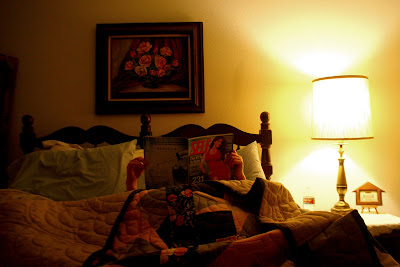Emily and I have decided it would be fun to take daily pictures of our lives and post them on
both our blogs.We will be swapping photos about twice a week (due to the long time difference and unpredictable lines of communication between Armenia and America) and posting them with some short words about what was/is significant about the picture. We're going to keep this up for the month of November.

Me: This is my sister, taken at night at my Grandmother's house. We used to share a bed when we were little and always at least a room after sharing a bed. We are night and day in personality, but when we are both together like this, alone, we end up talking until the both of us eventually don't have to say anything about being too tired and then we turn over and fall asleep. It's also about the moment that we get before we turn off the lights, the half hour or so that magazines and books soothe us into a slumber and we think about all that is possible

Emily: The first snow of the year on the mountains above Yeghegnadzor.
 Me: This is my sister, taken at night at my Grandmother's house. We used to share a bed when we were little and always at least a room after sharing a bed. We are night and day in personality, but when we are both together like this, alone, we end up talking until the both of us eventually don't have to say anything about being too tired and then we turn over and fall asleep. It's also about the moment that we get before we turn off the lights, the half hour or so that magazines and books soothe us into a slumber and we think about all that is possible
Me: This is my sister, taken at night at my Grandmother's house. We used to share a bed when we were little and always at least a room after sharing a bed. We are night and day in personality, but when we are both together like this, alone, we end up talking until the both of us eventually don't have to say anything about being too tired and then we turn over and fall asleep. It's also about the moment that we get before we turn off the lights, the half hour or so that magazines and books soothe us into a slumber and we think about all that is possible Emily: The first snow of the year on the mountains above Yeghegnadzor.
Emily: The first snow of the year on the mountains above Yeghegnadzor.
